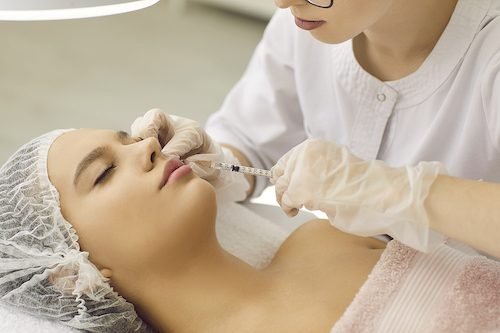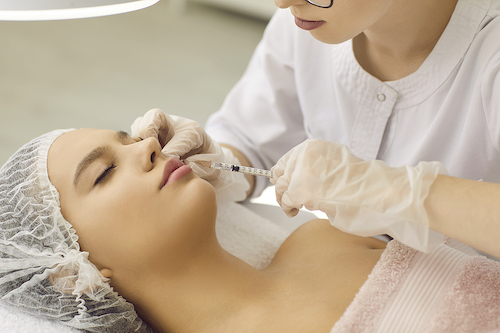
[ad_1]
 Botox isn’t just useful for wrinkles, it might even reduce anxiety.
Botox isn’t just useful for wrinkles, it might even reduce anxiety.
Botulinum toxin is a medicine that is often used for wrinkles, to help ease migraines, for muscle spasms, and to assist with incontinence.
Now research published in Scientific Reports has found that people who had botox injections across four different areas of the body reported less anxiety than their peers.
“We found that patients treated with Botox have fewer incidents of anxiety compared to patients treated with other medications for the same conditions,” Ruben Abagyan, PhD, author of the study and a professor of Pharmacy at Skaggs School of Pharmacy and Pharmaceutical Sciences at the University of California San Diego told Theravive.
The researchers used data from the US Food and Drug Administration (FDA) Adverse Effect Reporting System database.
The database contains reports from nearly 40 thousand people, detailing what happened to them after receiving botox treatment.
Whilst numerous adverse effects are reported through the database, Abagyan and colleagues decided to look in the opposite direction at the beneficial side effects.
They searched the database for a reduction in anxiety frequency, or anxiety-related disorders and compared what they found to a control group.
They then used an algorithm to find differences between those who had received botox and those who received other treatments for the same condition.
The researchers found that reported anxiety risk was between 22 to 72 percent lower in those who had been treated with botox in certain areas.
This applied to those who had been treated with botox in the face and head for migraine, in the face for cosmetic purposes, in the neck muscles and in the upper and lower limbs of the body.
The research follows a similar study published in 2020 by the same team.
They used the same FDA database to conclude that depression was reported significantly less than other patients who underwent treatment for the same conditions.
Like the anxiety study, the authors found a reduction in reported symptoms for many different injection sites.
This disputes the idea that someone might simply feel happier because they don’t have wrinkles, or because a person may not frown due to botox.
The researchers believe botox may reduce both depression and anxiety through a specific molecular mechanism.
They have a few ideas about how this may occur. One possibility is that botox travels to the area of the central nervous system that controls mood and emotions.
Another idea is that the neuromuscular junctions that the botox is injected into may communicate directly with the brain in some way.
A final idea is that the botox might be used to treat conditions that may contribute to anxiety. By relieving the underlying problem, indirectly levels of anxiety may also be impacted.
The study authors note that the data they used wasn’t originally collected with the intention of examining the association between the use of botox and a reduction in anxiety.
They also note that the database only contains reports from people who had experienced some negative side effects.
However, they say the research warrants further investigation.
“Our study provides a solid foundation for further studies of the molecular mechanisms associated with anxiolytic effect, and justifies controlled clinical trials,” Abagyan said.
“Our study implies a more elaborate mechanism that involves the central nervous system. We need to keep pushing for controlled trials to see if this observation can be converted into treatment,” he said.
Anxiety disorders are the most common form of psychiatric disorders.
Nearly 30 percent of adults in the US are impacted by anxiety at some stage in their lives.
Whilst treatment is available, it is ineffective in one third of people. This is why researchers like Abagyan hope their work paves the way for more options.
“Psychiatric conditions are complex, difficult to treat and not fully understood. Finding new treatment modalities is of great importance. These discoveries can be made using massive clinical data being accumulated by clinicians and regulatory agencies.”
Elizabeth Pratt is a medical journalist and producer. Her work has appeared on Healthline, The Huffington Post, Fox News, The Australian Broadcasting Corporation, The Sydney Morning Herald, News.com.au, Escape, The Cusp and Skyscanner. You can read more of her articles here. Or learn more about Elizabeth and contact her via her LinkedIn and Twitter profiles.
[ad_2]
Source link